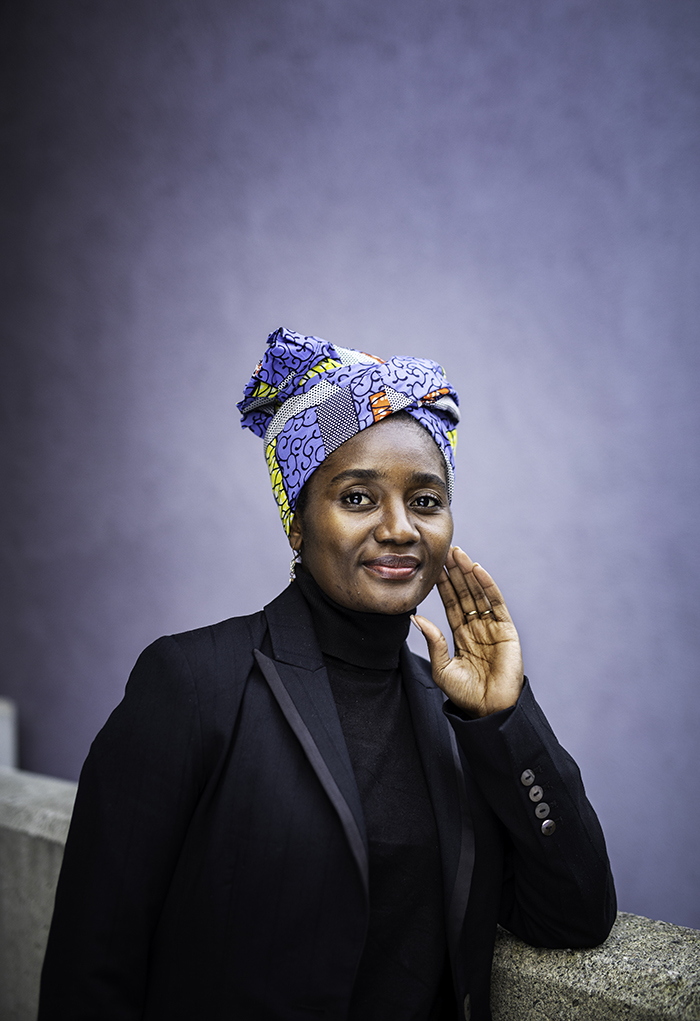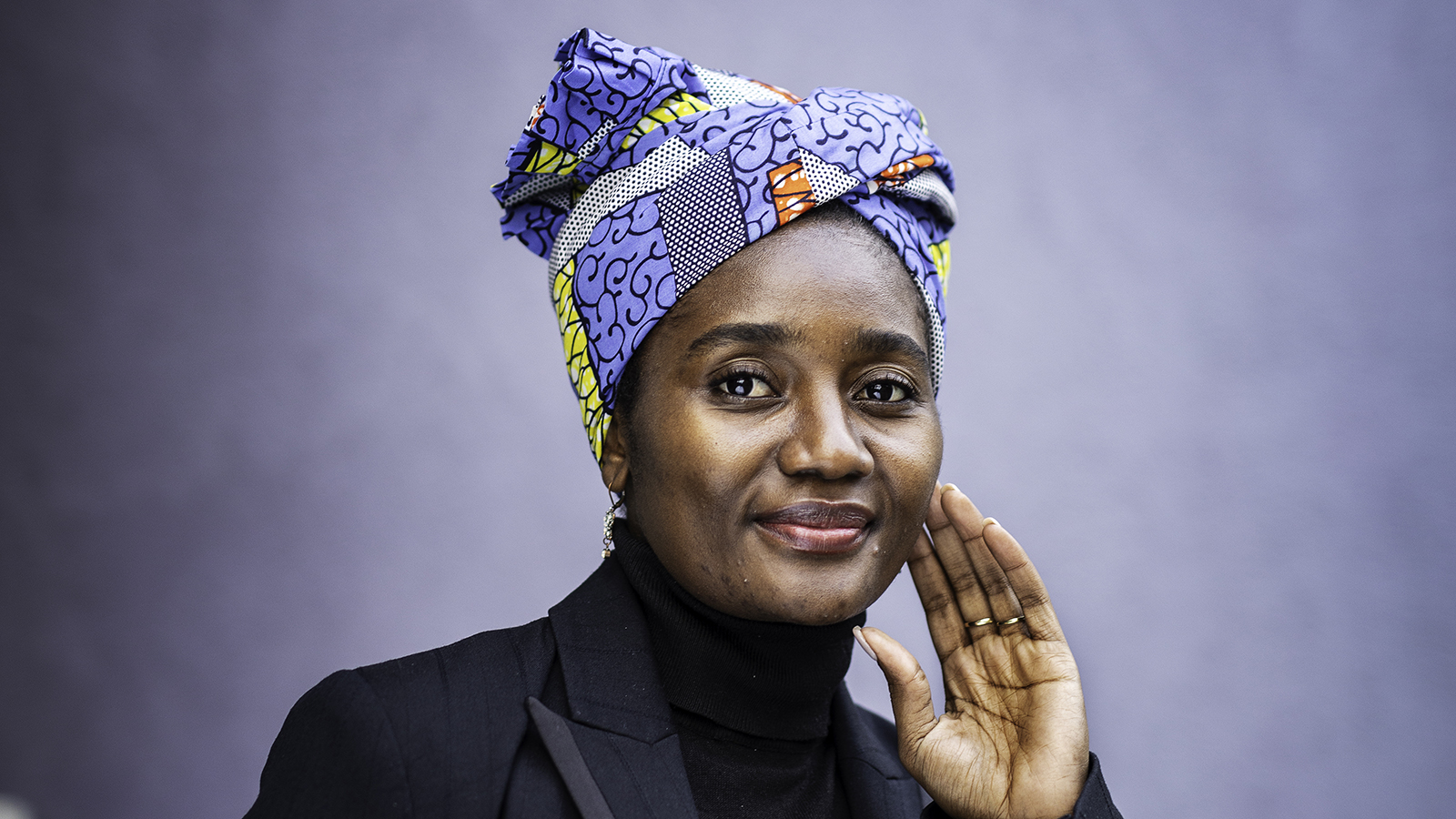Irene Kinunda Afriyie was selected to be portrayed in the third edition of the “Portraits of Strength” photo exhibition by the Rafto Foundation, a member of the Network of Human Rights Houses. The photograph was taken by Ingvild Festervoll Melien in Bergen, Norway, December 2024.
Why did you become a human rights defender?
I grew up without my parents due to the war in my country of birth. I am doing well today thanks to the help and support I received from so many people over the years. The least I can do is to try and contribute positively to both the society I live in and the one I come from.
I don’t see myself as a human rights defender, but rather as a privileged individual with a voice. I want to use that voice to shed light on complex and challenging issues, whether through writing or speaking.
What is the nature of your work and what challenges do you face as a woman human rights defender?
I advocate for equality and equal opportunities for all, regardless of background, gender, or circumstances. My work focuses on creating a society where everyone has the chance to thrive and contribute without facing unnecessary barriers or discrimination.
I understand that systemic change often requires years, even decades to unfold. However, it’s challenging for me to remain patient especially when I know that there are others advocating for the same cause, and that many have worked tirelessly for these same issues long before us.
When I began writing, I would get comments like “Did you write this yourself?” because it was well-formulated and well-written. It was discouraging. It doesn’t feel like that any more though, people now recognise my style. One thing is that many people don’t know writers from Congo, we are not so many especially since there is a lack of women writers.
As a writer, there is a challenge with resistance and getting through with the messages. The last time I had an article about racism, people were so defensive and they accused me of being a racist… it was so bad. Another example, in Congo now there is a war going on as we speak, we need to arrange demonstrations, but it’s not easy because there are so many feelings involved, people have been hurt, and their families have been hurt. I used to see Rwanda as the enemy, but now I firmly believe that in order to move forward, we must stop seeing Rwandans as enemies. We need to look beyond the obvious.
What is the current human rights situation in your country?
Norway upholds a strong commitment to human rights and social equality, with progressive policies and a proactive stance on many global issues. Yet, challenges such as gender-based violence, racism, and discrimination persist. Recent research has shown that individuals with names suggesting roots outside Norway are less likely to be called for a job interview, highlighting very known biases in the labor market.
Challenges in my country of birth are many, if I had to choose one, then I would say that I find it deeply troubling that so many people in my country do not have official identification, especially in the villages and among the poor. To address this issue, we are working on developing digital tools that will not only help combat corruption, which is a well-known problem but also provide individuals with a reliable form of identification, empowering them to claim their rights and opportunities.
What kind of human rights situation in your country would you like to see in the next 30 years?
It is true that there have been many wars and disasters on the African continent, but Africa is so much more than that. The one-sided portrayal of Africa is a significant problem that needs to be addressed.
In the next 30 years, I envision a profound transformation in how not just my country of birth, the Democratic Republic of Congo, but the entire African continent is perceived on the global stage.
My hope is that Africa will no longer be viewed through the outdated lens of a “hopeless continent” but rather as a dynamic and thriving region filled with boundless opportunities and potential.
I also hope that Africa will no longer be seen as a continent dependent on aid for survival. Africa is a continent rich in natural resources, cultural diversity, and human capital. I am confident that this shift in perception will not only benefit Africans but also contribute positively to the entire world.
Can you describe your motivation to be a human rights defender?
My motivation to be a human rights defender is deeply rooted in my personal experiences and the desire to ensure that no one, especially children, has to endure what I went through. I know what it feels like to be vulnerable, to face challenges that seem insurmountable, and to struggle against circumstances beyond your control.

About Portraits of Strength
Women human rights defenders (WHRDs) work to protect and advance freedoms while facing discrimination and stereotypes about their role and participation in society.
HRHF seeks to honour and promote independent women human rights defenders and their work through the “Portraits of Strength: Women Defending Human Rights” photo exhibition and highlight the human rights situation in the countries of the Network of Human Rights Houses.
The exhibition, now in its third edition, shares portraits and stories from WHRDs working on a variety of issues including the documentation of human rights violations and alleged war crimes, rule of law, women’s rights, political prisoners, freedom of expression, and more.
Find out more here.





